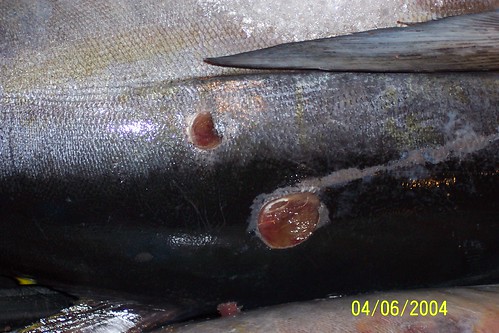If you've ever watched a National Geographic or Discovery Channel special on the deep sea, you know just about everything that lives in the dark part of the ocean is a Sci-Fi writers dream. The species are so diverse and strange that even the best thought-out aliens hardly hold a candle to the bizarre life that lives in the deep. They have fish with lighted lures, strange, colorless creatures, octopuses that resemble elephants, and, of course, this week's parasite.
The Cookie Cutter Shark, Isistius brasiliensis
Imagine you're in the deep. You look above you, and contrasting the very, very slight glow from above you see a small fish. What a tasty little morsel, you think, and you swim closer to investigate your lunch. Suddenly, the little fish disappears, and is replaced by one ten times its size, which quickly grabs a hold of you, rips out a piece of flesh, then disappears into the deep darkness.
You've just met the cookie cutter shark. They're malicious looking creatures with a unique and incredible method of parasitism.

Bioluminescent camouflage
Cookie cutter sharks aren't big fish by any stretch of the imagination (roughly 20" at max), but they pretend to be smaller ones to attract their host. Their undersides are bioluminescent except for a small patch. When viewed from below, the shark looks like it's much smaller than it actually is, attracting predatory fish and even marine mammals to come closer for an easy meal. That's when the shark attacks.

Cookie Cutter Scars
You see, the little guy is far too slow to catch its hosts on its own - it has to lure them closer. Once within range, the sharks unique lips act like a suction cup affixing its mouth to the side of its meal. With a quick, spinning action, its razor-sharp circular jaw slices out a plug of flesh, much like a cookie cutter cutting through dough. The parasite then swims away, leaving the wounded host confused and scarred.
Cookie cutter sharks don't just attack fish. They're well known for taking plugs out of marine mammals, and even non-marine ones. That's right - they DO attack humans. The sharks have been pests for the navy and deep-sea vessels for awhile, taking plugs out of neoprene covers and even reportedly shutting down a submarine by removing some critical rubber piece. But in March, Mike Spalding, a Hawaiian swimmer, was reportedly bitten by a cookie-cutter shark while attempting to swim across Alenuihaha Channel. The shark in question took a 5.5 cm long and 6.7 cm wide chunk out of his lower calf.

